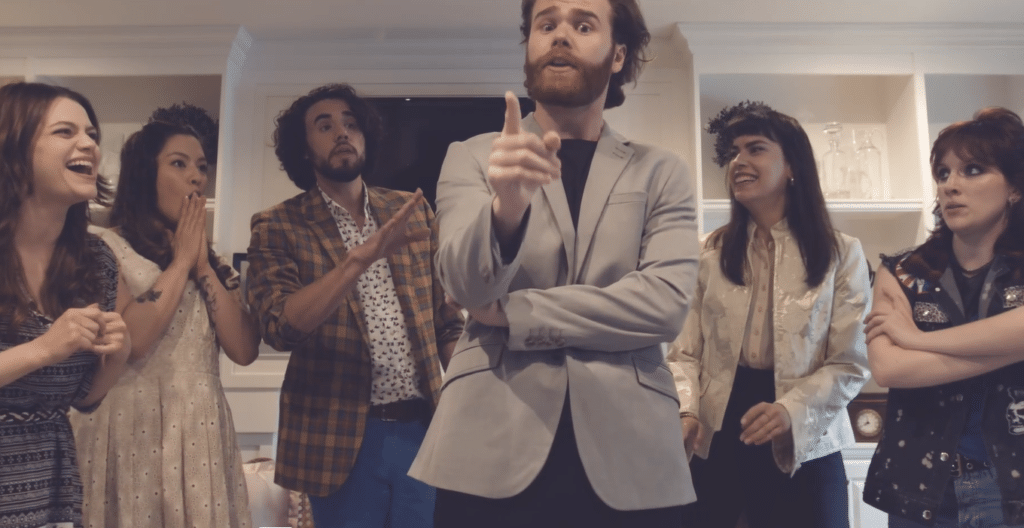
Don’t be misled by the title ‘Unfriending’ – as I was at first – into thinking this film has anything much to do with the kind of ‘unfriending’ we associate with social media and the internet (and for which the term was coined). Whilst this film covers the kinds of attitudes to friendships which are perhaps more prevalent in the social media age, it’s rather an honest-to-goodness dinner party drama which edges into dark, horror-adjacent territory. Things get uncomfortable, strained, then strange and horrifying, with a very dark key theme which is teased apart and explored throughout the film. It works very well; it’s low-key, but brutal in its way nonetheless.
We start with a young man getting ready at the mirror in the bathroom of a grand house, before heading downstairs to help with the prep (read: to complain about the prep) for an important dinner party. A dinner party: already we’re primed for the worst, as no one makes films about successful dinner parties. Mind you, what are we calling ‘success’ here? We glean that the dinner is all in honour of a mutual friend called Isaac: hosts Blake (Sean Meldrum) and girlfriend May (Simone Jetsun) have pulled out all the stops to make it a memorable meal, even if Blake emanates envy and irritation. So why are they hosting this dinner at all, given that Blake can hardly repress his dislike of Isaac – one of his best, longest friends? And wait: why did May just mention a ‘funeral’? Is Isaac ill?
More guests arrive and, as they talk, it turns out that this is a kind of intervention, rather than a simple social catch-up. But it’s not an intervention where friends and sometimes family get together to do the best they can to help someone thrive; the big idea here is that they all want to convince Isaac to commit suicide. They have, they feel, rock-solid reasons for encouraging him to do this, allowing themselves plenty of time to mull it over on his behalf. The film takes some time to settle into its groove here, being a very dialogue-heavy affair which takes place across a few rooms of the house for the most part, and it takes a moment to to get us into that; this isn’t a high-action thing, and it lags a little as it sets out its store.
Essentially, we as viewers are soon ready for Isaac himself to turn up, because he has been built up by this discussion by his peers (particularly by the odious Blake, whose one-upmanship with his friend of thirty years is made clear). But, at last, the man of the moment (Alex Stone) arrives: jaded, nervous, instantly sympathetic, and actually, unfortunately, quite excited to see everyone. What’s less expected, given the discourse on his many personal failings, is that he has turned up with a hot date in tow. Lexxi (Golden Madison) is an outsider here, and as such, a complicating factor.
The plot thickens as the night progresses. As it does so, the conversation (and the action) become increasingly mean, to the point of being excruciatingly cruel in places (and if you’ve ever rooted for an underdog, then you’re bound to feel something for Isaac). But all of this accompanies a series of pleasing twists and developments, so that – however unpleasant the original premise is – it doesn’t define the plot in simple terms. There’s more to come here.
There’s much to admire in Unfriending, even if with some of it, you do have to wait for it (the film’s script does an excellent job of delivering little clues and references which it picks up on later – it’s a pleasing thing to experience, showing lots of skill from writers/directors Brett M. Butler and Jason G. Butler). The little visual details – like Blake draining the bag from the cheapo box of wine – show nice attention to detail, whilst moments of awkwardness and absurdity (with more and more physical aspects) add depth to the conversation-heavy style of the film. Some of the initial comments on ‘consent’, ‘cancel culture’ and similar feel a little clumsy, though, as above, the script returns to these ideas, fleshing them out and reiterating their relevance. The sharper edges of the dialogue are all nicely handled and super mean-spirited; some of the repartee is very strong.
There’s decent acting here too, in some cases from relatively new actors: you can certainly love to loathe this bizarre bunch, and the performance style matches the central premise well. Of course the question has to be, why are these people even friends? Well, these things happen; we have another recently-coined word for it, ‘frenemy’; the film’s social satire picks up on the relationships between these people and sees them through to a satisfying conclusion.
In some respects, this film feels like it could have been a stage play: that’s not to disrespect it as a film, but just to point out that the rate and style of its reveals, its use of sets and its use of its script to carry its plot along feel like they could work in that environment, too. But the way it all comes together and the ways it grows its characters makes for an engaging indie movie which has plenty to say, and interesting ways to say it.
Unfriending (2023) is hitting the summer festival circuit at present, hitting Cobb International on Friday, August 4th.
